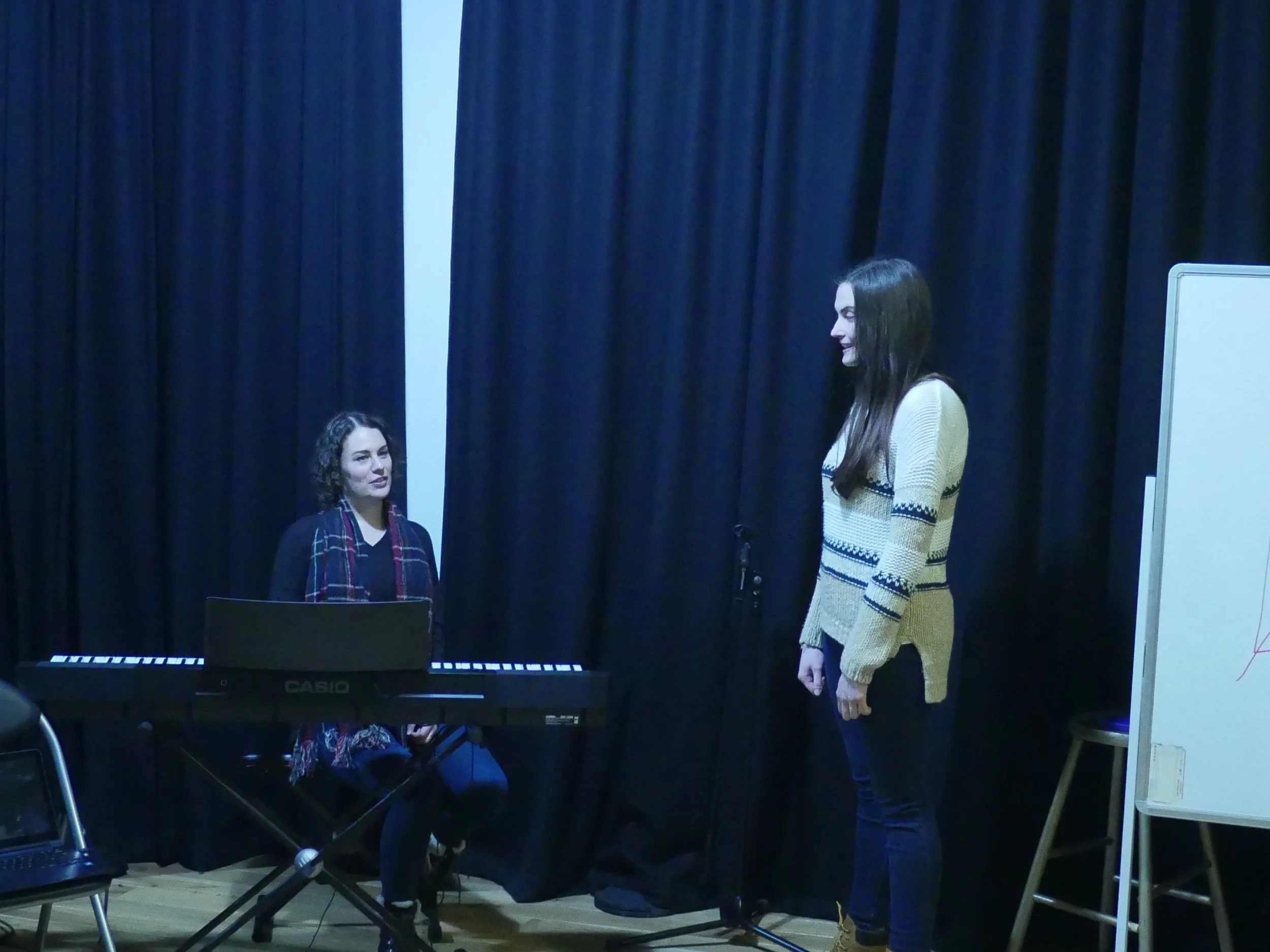Tongue-Tie–Aware Vocal Coaching for Adult Singers
Gemma Milburn — Tongue-tie aware vocal coach for adult singers.
Singing can feel very different when you’re tongue tied.
Even if people tell you that you sound great, there can be a niggling sense that something isn’t quite right- that you’re working harder than other singers, or simply that a piece of the puzzle is missing.
Many tongue-tied singers describe being asked, “Why can’t you just do that?”- even when they’re trying their hardest to get their voice to ‘behave.’
Many singers arrive here after reading my writing on tongue tie and singing, or after years of lessons that never quite addressed how their body actually works.
Challenges Tongue-Tied Singers Often Experience
For the tongue tied singer, these aren’t always easy to name. Tongue tie is something that people are born with, so it can be difficult to compare or know what’s “normal.” Despite this, there are patterns that show up again and again, even in singers who sound great from the outside.
Vocal fatigue
Feeling tired sooner than other singers— as though singing takes more effort than it should.
Difficulty with agility
Runs, quick transitions, onsets, or fast musical phrases feel harder to coordinate than they seem for other people.
Range feeling limited at both ends
High notes may feel tight or unreachable; low notes may feel unstable, breathy, or lacking clarity.
Tone feeling either overly breathy or overly pressed
It can be difficult to find a balanced, comfortable sound without slipping into one extreme or the other.
Challenges with breathing and “not feeling what you’re supposed to feel”
Many tongue-tied singers don’t experience the sensations teachers describe — like ribs expanding, abdominal engagement, or the belly moving on an exhale. Some even notice the opposite patterns.
Struggling to achieve the “ease” others describe
Even with good technique, warm-ups, or years of lessons, singing still feels like it requires more effort than it should.
A sense that something isn’t keeping up
Many singers describe a feeling that no matter how much they practise, some part of their voice feels unresponsive, slow, or stuck — even when everything “should” be working.
How Tongue Tie Can Influence Singing
Tongue tie doesn’t just affect the tongue itself- it can influence how the whole singing system behaves. The tongue is part of a network of fascia and muscular connections that extend from the tongue, through the diaphragm and all the way down to the toes. When movement in one area is limited, the body adapts elsewhere to keep the voice functioning.
Here are some of the ways tongue-tie-related patterns can show up in singing:
The tongue can’t shape sound as freely
Even if you’re not aware of it, limited movement in the tongue or the surrounding fascia can affect how easily vowels and resonance spaces adjust. This can make certain sounds feel less achievable.
Other muscles work harder to compensate
Because the tongue and its fascia connect through the floor of the mouth and into the jaw and neck, those areas often step in when the tongue can’t move as needed. This can lead to jaw involvement, lip tension, or neck strain, even when you’re ‘trying to relax.’
Breathing can feel confusing or out of sync
The tongue sits on top of the airway and influences how breathing patterns develop over time. Tongue-tied singers often have long-standing habits like shallow breathing, mouth breathing, or paradoxical breathing, which can make traditional breath cues difficult to sense or achieve.
Coordination feels slower or inconsistent
When several areas of the body are compensating, the system may respond differently day to day. Some sounds may feel more effortful or unpredictable, even with good technique.
Post-release changes take time to integrate
For singers who have had a release, the fascia and muscles involved may need gentle, consistent work to adapt to the new freedom. With the right support, the voice can develop new habits.
If you’d like to read more about my own tongue-tie journey, you can find it by clicking here.
How I Support Singers Who Are Tongue Tied
Singers who are tongue tied often need a different approach — one that respects the ways their voice has learned to adapt. My work focuses on creating ease, stability, and freedom without pushing the voice or overriding the body’s natural patterns.
A coach who has been where you are
As someone who was tongue tied myself, I understand how these patterns feel physically-the fatigue, the compensations, the “why doesn’t this work for me?” moments. That embodied experience means I won’t ask you to force shapes or sensations that your body simply can’t access yet.
Experience with myofunctional therapy and complementary approaches
I’ve been through myofunctional therapy and understand how the tongue, jaw, breath, and airway are trained in that process. I work in a way that complements this work.
Tongue-tie-aware vocal pedagogy
I use gentle, anatomically informed exercises that support the tongue, lips, jaw, and breath to work together without strain. The aim isn’t to push your voice, but to help your body discover coordination that feels natural and sustainable.
Working compassionately with long-standing patterns
Many tongue-tied singers have relied on compensations for years. We approach these patterns with curiosity, not pressure, building new habits gradually so your voice doesn’t feel overwhelmed or unstable.
Integrating functional breathing and Buteyko principles
Breathing patterns can be deeply shaped by tongue posture and airway behaviour. When helpful, I blend gentle breath retraining into the work — especially for singers who have never felt the sensations that standard breathing cues assume.
Pre-release, post-release, and no-release support
Whether you’re preparing for a release, integrating changes afterwards, or not planning a procedure at all, the focus is on your voice, your body, and your goals. There is never any pressure to make medical decisions.
A personalised, singer-led approach
Every tongue-tied singer’s experience is different. There is no single pathway or sequence. We move at the pace your body feels safe with, prioritising ease, stability, and the joy of singing.
Ready to explore this with someone who understands?
If you recognise yourself in these experiences, you’re welcome to book a Discovery Call. It’s a relaxed conversation where we can talk about what your singing and whether working together feels like a good fit.
-
Yes. Many tongue-tied singers have developed effective compensations and can sound very capable on the surface. However, underlying patterns can still affect effort, stamina, consistency, or ease — especially under pressure, fatigue, or increased vocal demand.
-
No. There is no single right path. Some singers benefit greatly from Myofunctional Therapy, vocal and breathing work alone, while others explore a release as part of their journey. My role is never to push medical decisions, but to support your voice in whatever context you’re in.
-
Yes. I support singers pre-release, post-release, and those not planning a procedure at all. Post-release work often focuses on helping the voice and body integrate new freedom gradually, without overwhelm or instability.
-
This is very common for tongue-tied singers. When parts of the system are compensating, effort can remain high even with good technique. Our work focuses on coordination and ease, rather than forcing sensations or outcomes.
-
Yes, when appropriate and with your consent. My work is designed to complement clinical or therapeutic support — not replace it — so that singers experience continuity rather than conflicting approaches.
Gentle, tongue-tie-aware vocal coaching for adult singers
For Singers and For Professionals
Singers who are tongue tied benefit from support that understands how their specific anatomy shapes the way their voice behaves. My approach is designed to respect those needs while also fitting smoothly alongside any therapeutic or clinical care a singer may already be receiving.
I support adult singers at every stage of their journey- whether they’ve had a release, are preparing for one, or aren’t planning a procedure at all. Because I was tongue tied myself and have been through myofunctional therapy, I understand both the physical sensations and the learning process from the inside.
For those working with clinicians such as SLTs, ENTs, dentists, OMTs, or other voice professionals, my role is to complement that work- never to replace it. When appropriate and with the singer’s consent, I’m happy to collaborate so that the support they receive feels consistent and connected.
If you’re ready for your singing to feel easier…
You don’t need to figure this out on your own. Whether you’re tongue tied yourself or a professional exploring options for a client, I’m here to help you understand what’s happening and what’s possible next.
A Discovery Call is the best place to start.



